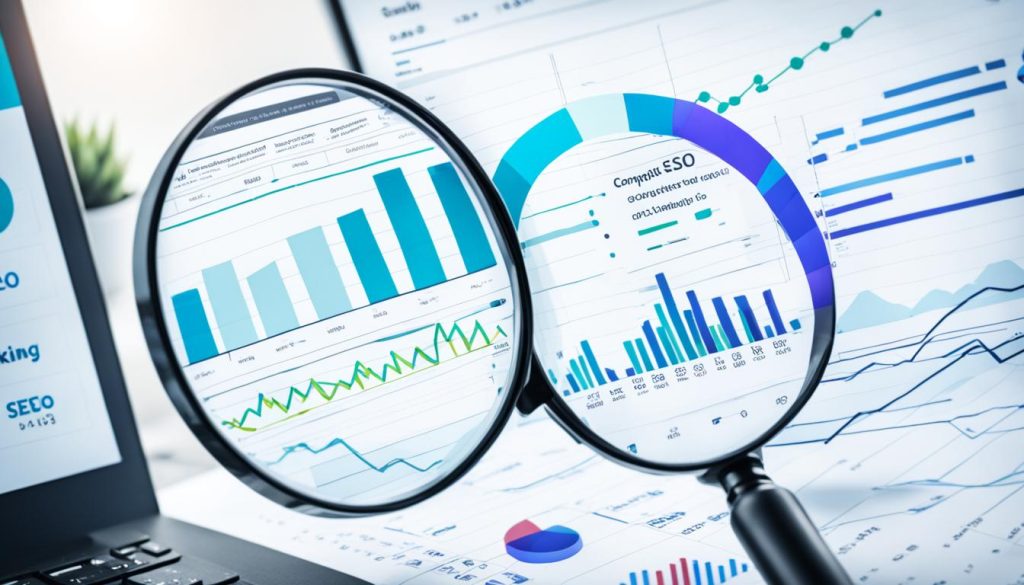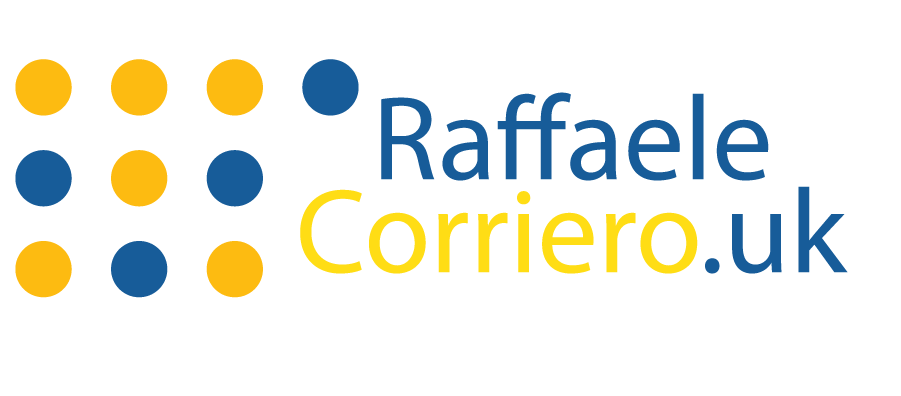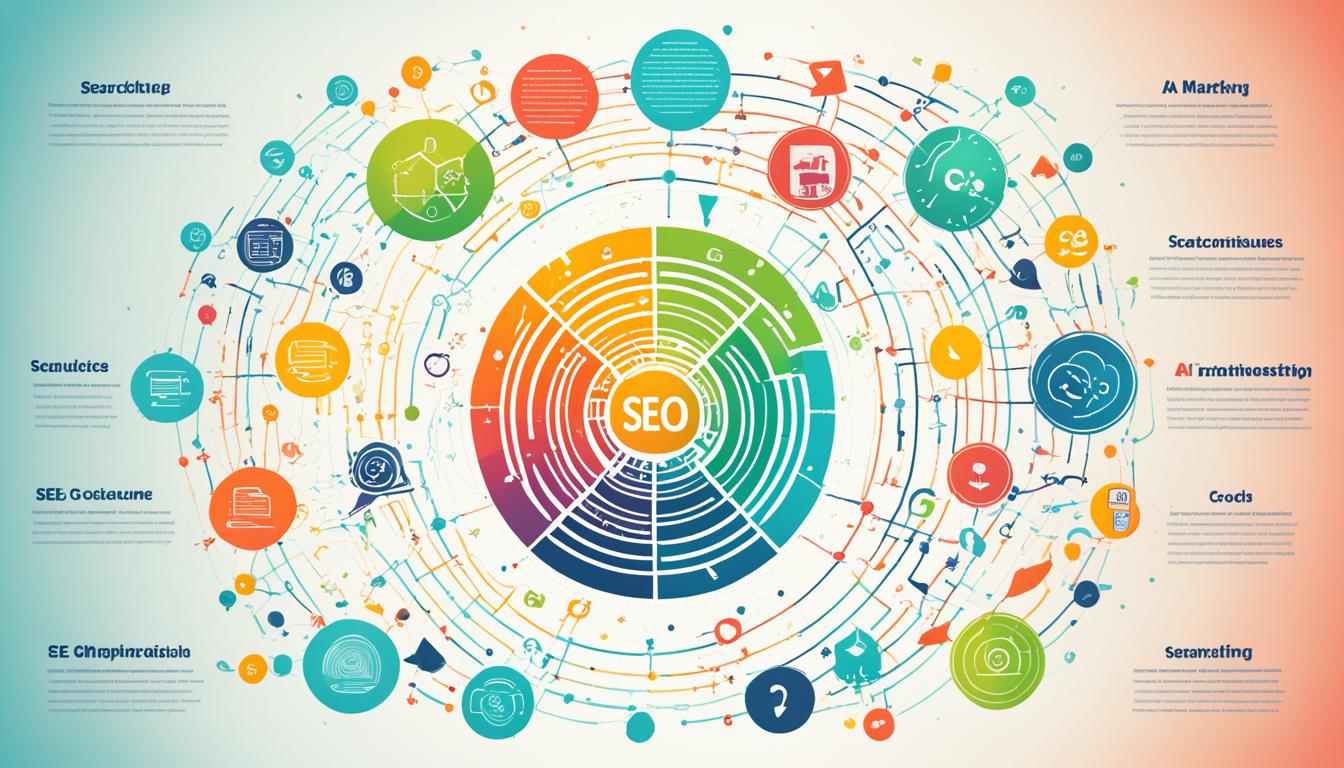Did you know that 68% of online experiences start with a search engine? This fact shows how crucial search engine strategies are in digital marketing. The world of SEO is changing because of artificial intelligence (AI). This change means we can now make search engine strategies even better.
Alexia, a top trainer on Udemy, has created a new course. It’s for those wanting to combine SEO and AI. Another expert, yesjerryer, talks about how AI helps in understanding SEO data. Tools like mipacademy give more insights on using AI in SEO.
But remember, using AI in SEO has to follow Google’s rules. If you create content just to improve rankings, you could get penalised. It’s key to focus on quality and honesty while using AI.
Key Takeaways
- SEO is key as 68% of online experiences begin with a search engine.
- AI is making a big change in how we do SEO.
- Alexia’s Udemy course helps teachers learn about SEO and AI together.
- Tools highlighted by yesjerryer are great for understanding SEO data with AI.
- It’s important to follow Google’s rules when using AI in your content.
Understanding the Fundamentals of SEO
Search Engine Optimisation, or SEO, is key for any digital marketing plan. It aims to make a website more visible in search results. This increases web traffic and helps businesses grow. Knowing the basics of SEO is vital for making the most of online platforms.
What is SEO?
SEO means making efforts to increase both the amount and quality of traffic to a website from search engines. It involves following certain rules to push a site up in rankings on platforms like Google and Bing.
Importance of SEO
The role of SEO in digital marketing is huge. Having a good SEO strategy means your website stands out in search results. This is crucial for getting more visitors and becoming more visible online. It leads to greater brand awareness, credibility, and attracts more potential customers.
Key Components of SEO
There are key elements every SEO strategy needs:
- Keyword Research: This is about finding what potential customers type into search engines when looking for products or services. It includes analysing data to find popular keywords.
- Content Quality: This involves producing useful and relevant information that satisfies user needs. Top-quality content is more likely to get shared and linked to, raising its SEO value.
- Backlink Strategies: This part is about getting links from other trusted sites. It can make a website more authoritative and rank higher in search results.
To build a strong SEO strategy, businesses need to grasp these basics. Such a strategy focuses on important ranking factors. This helps to place their website higher on search engine results pages.
The Role of AI in Modern SEO

AI in SEO is changing how we shape our digital marketing plans. Thanks to machine learning and auto data checks, SEO experts can sort through big data easily. They can also guess search trends and make online experiences better than ever.
Introduction to AI
At its heart, artificial intelligence means making machines do tasks that would usually need human brainpower. In SEO, AI uses automated checks to make tasks quicker than doing them by hand. This step forward has made digital marketing more accurate and effective.
How AI is Transforming SEO
AI has a big impact on SEO in different ways:
- Predictive Search Patterns: AI predicts search behaviour by looking at past data and trends. This helps in guessing what users want and in creating content strategies that meet their current and future needs.
- Machine Learning Algorithms: Now, SEO relies on smart learning algorithms. These systems change and get better as they learn from what users do. This makes search results more accurate and relevant.
- Automated Data Analysis: AI can check huge amounts of data quickly. It finds important SEO trends and insights much faster than old ways.
Content is now being optimised in a smooth way with changing search engine rules thanks to AI. This gives a big edge over the competition.
Combining SEO Basics and AI
Using artificial intelligence in SEO can make digital marketing much better and more effective. By adding AI to SEO basics, businesses can stand out from the competition.
Benefits of AI-Driven SEO
The key benefits of using AI in SEO are better keyword research, custom content, and improved analytics. AI can quickly sift through huge amounts of data to find trending keywords. It also tailors content perfectly for specific audiences.
Additionally, AI helps marketers create adaptive SEO strategies. These strategies can change quickly when search engines update their algorithms.
Challenges in Implementation
However, using AI in SEO has its challenges. Keeping user data safe is a big concern. Also, keeping up with complex algorithm changes requires constant attention.
To make AI work in SEO, it’s important to be open about how AI is used. Finding the right mix of automation and human input is also key.
In conclusion, AI can greatly improve SEO, but success depends on focusing on privacy, transparency, and staying up-to-date with algorithms.
AI Tools for SEO
In our digital age, using AI for SEO is crucial. AI solutions help marketers fine-tune their search strategies. Tools like ChatGPT and Surfer are becoming key for automating SEO tasks.
Popular AI SEO Tools
ChatGPT and Surfer have become essential for SEO recently. ChatGPT excels in creating relevant content. Surfer, on the other hand, analyses data deep and optimises content well. These tools are crucial for marketers today.
- ChatGPT: Known for creating content that aligns with user intent and SEO objectives.
- Surfer: Provides detailed competitor analysis and keyword recommendations to fine-tune SEO strategies.
- Jasper: Another leading tool that uses AI to generate and optimise content, ensuring relevance and engagement.
Features to Look For
Choosing the right AI SEO software is about looking for key features. Good AI tools analyse data clearly to spot trends. They also automate SEO tasks like keyword generation and predict how efforts will impact rankings.
- Intuitive Data Analysis: Allows for the thorough examination of SEO data to uncover insights and trends.
- Custom Keyword Prompts: Generates targeted keyword suggestions based on current market demands.
- Predictive Performance Modelling: Helps anticipate the impact of SEO efforts on future search engine rankings.
Using ChatGPT and Surfer can make your SEO work easier. They help in optimising fully, leading to better results and more visibility online.
AI-Powered Keyword Research
In the fast-changing SEO world, keywords are still crucial for being found online. Using AI to find the right keywords is now essential. AI helps make finding and choosing keywords smarter, leading to better traffic strategies.
Importance of Keyword Research
At the heart of SEO, keyword research is key. It’s about knowing what people search for online. This knowledge lets businesses make content that answers people’s searches, which boosts their chances of drawing in more visitors.
AI Techniques for Keyword Research
AI has changed how we do keyword research. It uses advanced algorithms to find keywords we might miss. This way, businesses can spot both broad and specific keywords leading to more tailored content. Using AI, they can keep up with trends and rank higher in search results.
Enhancing Content with AI

In today’s digital world, AI is changing how we make and improve content. It helps make your content better and more relevant, hitting SEO goals.
Content Optimisation Techniques
AI editing tools make it easier to enhance content. They give instant advice on structure, tone, and clarity. These tools use machine learning to suggest the best ways to be seen more in searches.
It’s now simpler to match content with what users want. AI helps in picking the right keywords and topics. This makes content more interesting and good for SEO.
Creating High-Quality Content
Making top-notch content is key for being noticed online. AI not only makes text better but also helps come up with ideas. Creators can then spend more time being creative.
AI also looks at how well content does. It gives tips on how to make things better in the future. This way, your content stays up-to-date and follows the newest SEO guidelines.
Using AI in content making makes the process smoother. It leads to better content more often. This boosts your online marketing strategy.
Building AI-Improved Link-Building Strategies
Link-building is vital for successful SEO. It boosts a website’s credibility and search engine rankings. Traditional methods need a lot of research and effort to create strong backlinks. Now, artificial intelligence (AI) is changing this, making the process more accurate and efficient.
What is Link Building?
Link-building means getting hyperlinks from other websites to yours. These backlinks act like thumbs-up for your site’s content. They tell search engines that your content is valuable. Good link-building improves your site’s authority and makes it more visible.
AI in Link Building
Adding artificial intelligence to link-building has many benefits. AI excels at sorting through lots of data to find good link opportunities. It uses machine learning to make reaching out to relevant sites easier, boosting your link equity.
AI also helps check the quality of backlinks. It spots spammy links and keeps your backlink profile in line with search engine rules. This keeps your backlink profile strong, ensuring high rankings. Using AI, businesses can upgrade their link-building, greatly improving their online presence.
AI for Competitor Analysis in SEO

In today’s fast-changing digital marketing world, using AI-driven insights is key for competition. Artificial intelligence helps in competitive SEO analysis. It shows what your rivals do well and where they fall short. This can help you find ways to grow and position your brand better.
Importance of Competitor Analysis
Understanding your competitors is vital for good search engine optimisation (SEO). It lets you see the tactics they use. This helps you figure out what’s working in your sector. With this knowledge, you can create better strategies to beat them.
By knowing what others are doing, you can make plans that really speak to what your audience wants. This means you can grab more of the market for yourself.
Utilising AI for Competitor Insights
Artificial intelligence is changing the game in analysing competitors. AI gives you AI-driven insights on how competitors perform. Using tools like SEMrush and Ahrefs, you can get smart competitor ranking tactics. These tools show you where you can do better.
AI helps you find what content you’re missing. This lets you create better stuff than your rivals. Having AI in your SEO strategy means you’re always ahead. You’ll use a smart approach to make the best moves and rank above your competitors.
SEO Data Analysis with AI
Understanding AI’s role in SEO data analysis boosts your digital marketing. AI helps make sense of large datasets. This provides clear insights for improving strategies.
Understanding SEO Data
SEO data includes keywords rankings, traffic sources, and user stats. Analysing this shows trends and improvement areas. With AI, SEO experts quickly spot patterns for better decisions.
Tools and Techniques for Data Analysis
There are many tools for SEO analytics. Google Analytics, SEMrush, and Ahrefs give deep insights. AI tools make analysing this data easier, offering actionable tips.
Using predictive analysis and automated reports helps understand data better. This leads to stronger strategies.
Creating Meta Tags Using AI

Meta tags help web pages stand out to search engines and users. Using artificial intelligence makes creating them quick and accurate.
Importance of Meta Tags
Meta tags, such as title tags and meta descriptions, are crucial. They sum up web content for search engines, improving indexing and visibility. Good meta tags also boost click-through rates by making search results more attractive.
How AI Generates Meta Tags
Artificial intelligence changes the way we generate meta tags. It uses deep learning to study loads of data. This helps create AI-generated tags that fit the content and contain the right keywords.
This method makes optimising meta tags easier. It also keeps up with new search engine rules. As a result, websites become more visible and attract more visits.
Optimising Images for SEO with AI
Images are key to making content attractive and support SEO goals. They should be optimised properly to boost search engine visibility and engage users.
Role of Images in SEO
Images boost user experience and keep visitors on your site longer. When optimised well, they can lift your site’s search rankings. Things like file names, alt text, and making images smaller help make your site better visually.
AI Tools for Image Optimisation
AI is changing the game for SEO image management. These tools create top-notch images, recommend alt text, and improve visibility in image searches. By analysing lots of data, AI helps stay in line with SEO changes.
These AI tools also pick the best image formats and sizes. This means your images load fast but still look great. It’s key for a smooth site experience, helping you outdo others in search rankings.
Generating Schema Markup with AI
Schema markup has become a key SEO tool, easier to use with AI. It makes search engines like Google understand web content better. This understanding can lead to better search results and more visibility.
AI helps make schema markup fast and accurate. By using AI, creating various types of schema is automated. This saves time. It’s great for businesses that update their content often. They can quickly adjust to new data.
Adding structured data to your site is a smart strategy. It improves how well search engines understand your site. This could make your site more visible in searches. Using AI for schema means you’re using a smart, modern SEO approach.
- Automated schema creation
- Accuracy in structured data implementation
- Enhanced search engine visibility
In short, using AI for schema markup leads to a better web presence. It makes your site easier for search engines and people to understand. This helps businesses see better search performance and engage users more.
Leveraging AI for Internal Linking
Integrating internal linking strategies can greatly boost your SEO. It makes it simpler for both search engines and users to navigate your site. By using AI, this process becomes smoother, improving the user’s journey and the site’s performance.
AI offers precise link suggestions, a big plus. It analyses content to suggest relevant internal links. This helps spread link value across the site and enhances the user’s experience. It makes your site easier for search engines to crawl through.
AI makes finding the best anchors and links easy. These insights help create a unified linking strategy that meets your SEO goals. This improves your site’s navigation and gives you an advantage in user engagement and optimisation.
AI’s automation and accuracy in internal linking are vital for site navigation. They create a strong, user-friendly site structure. This is key for good search engine ranks and a great user experience.
- Improved crawlability for search engines
- Enhanced user journey through intuitive link suggestions
- Efficient distribution of link equity
Improving Page Experience with AI
The digital world is becoming more competitive. It’s vital to improve the page experience for SEO success. User experience optimisation is key for keeping visitors happy and meeting search engine standards. These standards are all about better performance and usability. Artificial intelligence (AI) provides many ways to enhance a website’s page experience.
Significance of Page Experience
Page experience is crucial because it affects how users see and use a website. Load time, mobile-friendliness, interactivity, and visual stability are important. A good user experience means people stay longer, bounce less, and are more likely to convert. This is great for SEO rankings. Good page performance keeps users happy and loyal.
AI’s Role in Page Experience Optimisation
AI has changed the game in making user experiences better. Tools like Microsoft Clarity use AI for deep insights into how users behave. They use heatmaps and click maps to see what parts of a website might need work. AI also helps tailor content to what users need, even predicting those needs. Plus, it can keep content fresh automatically.
With AI, businesses can look closely at how their pages perform and make them better match what users want. AI can handle big data, making optimisation smarter and more effective. This means a better experience for users and stronger SEO results.







